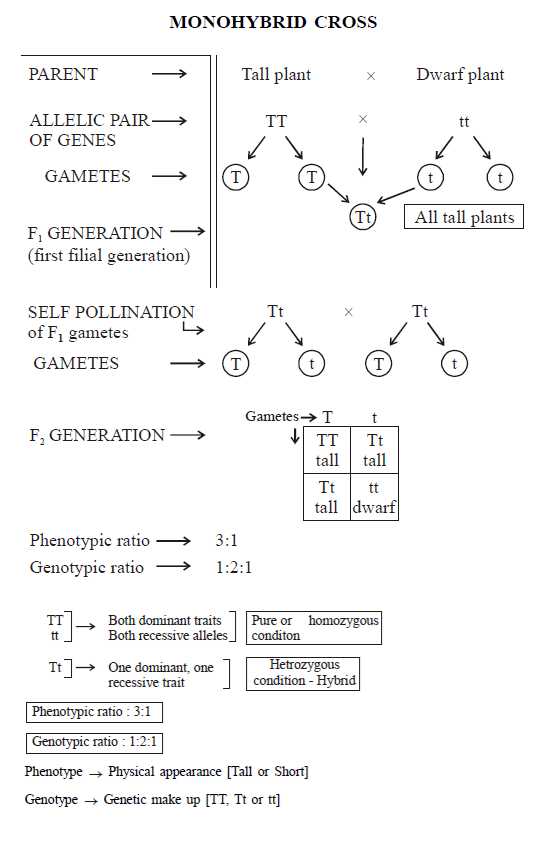
Explain with example how traits get expressed?
Answer
566.7k+ views
Hint:The controlled and integrated actions of genes can produce specific sets of proteins with characteristic structures that carry specific modifications needed for the cells to function.
Complete answer:
Traits are coded in the form of genes and genes are the sequences which code for particular polypeptides which lead to the formation of particular proteins. Proteins then lead to the expression of particular traits.
The gene which decides the physical appearance of an organism even in the presence of another alternative gene is known as a dominant gene. The trait expressed is called a dominant trait. A dominant trait is expressed only when two copies of the genes are present. The dominant gene is denoted by a capital letter. The gene which decides the physical appearance of an organism only in the presence of another similar gene is called a recessive gene. The trait expressed is called a recessive trait. The recessive gene is denoted by a small letter.
In an example of the pea plant, there are two types of genes for the plant height-‘T’ and ‘t’. In this, pure tall (TT) pea plant was crossed with dwarf (tt) plant.
In F1 Generation: All the plants obtained were heterozygous tall (Tt). These plants from F1 generation were self-pollinated to obtain F2 generation.
In F2 Generation: In this cross one homozygous tall plant (TT), two heterozygous tall plants (Tt) and one homozygous dwarf plant (tt) were obtained.
In F2 Generation: In this cross one homozygous tall plant (TT), two heterozygous tall plants (Tt) and one homozygous dwarf plant (tt) were obtained.

Note:In both, prokaryotic and eukaryotic cells, controlled and integrated actions of genes can produce specific sets of proteins with characteristic structures that carry specific modifications needed for the cells to function. This process is called “gene expression”, which refers to the conversion of the information encoded in a gene first into messenger RNA and finally to a protein.
Complete answer:
Traits are coded in the form of genes and genes are the sequences which code for particular polypeptides which lead to the formation of particular proteins. Proteins then lead to the expression of particular traits.
The gene which decides the physical appearance of an organism even in the presence of another alternative gene is known as a dominant gene. The trait expressed is called a dominant trait. A dominant trait is expressed only when two copies of the genes are present. The dominant gene is denoted by a capital letter. The gene which decides the physical appearance of an organism only in the presence of another similar gene is called a recessive gene. The trait expressed is called a recessive trait. The recessive gene is denoted by a small letter.
In an example of the pea plant, there are two types of genes for the plant height-‘T’ and ‘t’. In this, pure tall (TT) pea plant was crossed with dwarf (tt) plant.
In F1 Generation: All the plants obtained were heterozygous tall (Tt). These plants from F1 generation were self-pollinated to obtain F2 generation.
In F2 Generation: In this cross one homozygous tall plant (TT), two heterozygous tall plants (Tt) and one homozygous dwarf plant (tt) were obtained.
In F2 Generation: In this cross one homozygous tall plant (TT), two heterozygous tall plants (Tt) and one homozygous dwarf plant (tt) were obtained.

Note:In both, prokaryotic and eukaryotic cells, controlled and integrated actions of genes can produce specific sets of proteins with characteristic structures that carry specific modifications needed for the cells to function. This process is called “gene expression”, which refers to the conversion of the information encoded in a gene first into messenger RNA and finally to a protein.
Recently Updated Pages
Master Class 12 Economics: Engaging Questions & Answers for Success

Master Class 12 Physics: Engaging Questions & Answers for Success

Master Class 12 English: Engaging Questions & Answers for Success

Master Class 12 Social Science: Engaging Questions & Answers for Success

Master Class 12 Maths: Engaging Questions & Answers for Success

Master Class 12 Business Studies: Engaging Questions & Answers for Success

Trending doubts
Which are the Top 10 Largest Countries of the World?

What are the major means of transport Explain each class 12 social science CBSE

Draw a labelled sketch of the human eye class 12 physics CBSE

Why cannot DNA pass through cell membranes class 12 biology CBSE

Differentiate between insitu conservation and exsitu class 12 biology CBSE

Draw a neat and well labeled diagram of TS of ovary class 12 biology CBSE




